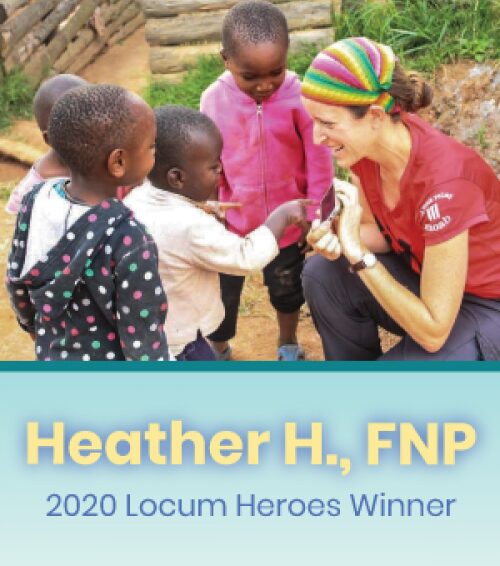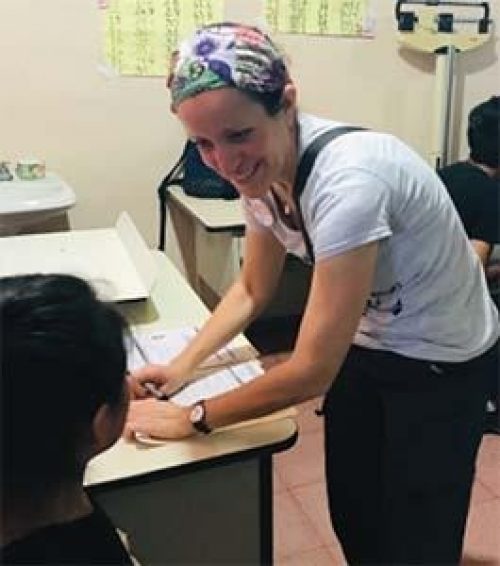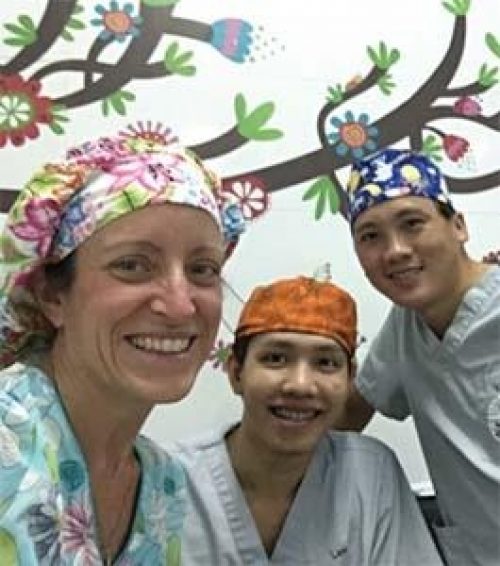Earlier this year, Barton Associates announced its second annual Locum Heroes campaign, with a focus on giving back to locum tenens providers who make a difference in their communities, near and far. In response, we received more than 100 nominations, each describing incredible stories of the ways that locum providers have spent their time on and between assignments.
Our judging panel chose Heather H., FNP as the 2020 Locum Hero for her work on her current locum tenens assignment, as well as her international volunteer efforts. As a Barton Associates Locum Hero, Heather will receive a personal award of $2,500, which she plans to donate. Another donation of $2,500 will be given in her name to the charity of her choosing. Continue reading to learn more about Heather’s deserving story, as well as the charities that she selected.

Meet Heather
Heather H., FNP currently works as a locum tenens provider at a tribally owned clinic in the Southwestern United States.
She has had a robust career of service, and originally chose to start locum tenens in order to accommodate her international volunteering. “Since 2012, I have had the unique privilege to travel to Rwanda once a year with a specialized team to help build surgical capacity in that country,” she says.
Heather has also traveled as a pediatric surgical nurse with various groups such as Operation Smile, Partners in Health, LDS Charities, and the U.S. Military, aboard the USNS Comfort and the USNS Mercy.
Read on to learn more about her work, and the charities that will receive donations through the Locum Heroes award.
Hi Heather, thanks for speaking with me today. We’ve been so impressed learning about all of your work. What was your first experience volunteering abroad?
My first experience was with Operation Smile in 2001, when I traveled to the Philippines. I worked at a hospital that was run by Catholic nuns, and it was a fantastic experience. I’ve been traveling ever since.
Later, you went to Lao Friends Hospital for Children. Could you speak about that?
I loved living in Laos, and it just happened at the right time in my life. I was only supposed to be volunteering there for a couple of months, but I extended my contract. I loved the model utilized by the children’s hospital. A local healthcare worker was paired with a volunteer, working side by side. The actual hospital only opened in 2015, and it services all of Northern Lao.
Now, let’s talk about Rwanda, because that’s another volunteer experience that has been a large part of your career.
I first went to Rwanda in 2012 through a small branch of Operation Smile, working closely with Partners in Health.
We first worked in the northern portion of the country in a small village. Dirt roads, very minimal utilities. The town had just received electricity a few years prior. It’s been exciting to see how the project has developed over time.
The main goal has always been to help build surgical capacity. There’s a huge focus on training and teaching. Eight years later, we are seeing that the training is making a difference.
What are the days like when you are there? And what challenges do you see in the country?
Generally speaking, they’re long, busy days. But it’s extremely rewarding work.
There are obviously challenges, such as the lack of resources that can be seen in many developing countries. Yet, what stands out to me is how amazing the people are.
From what I’ve seen, the people in these countries are incredible because they just keep going. I actually feel better when I go to visit them, and yet I’m supposed to be going to help them.

How do you think that your work impacts the local health care workers on these trips?
The local health care workers are eager to learn. They don’t care about the long hours; they work as hard as everyone. They want to make their communities better. I always think of that saying, “You give a man a fish, you feed him for a day. But you teach a man how to fish, and you can feed him for a lifetime.” I would hope that our work can help. Education goes both ways. I feel like you can learn from each other.
And I feel like we hear the same thing from many locum providers. Every facility that they go to, every area of the country, these providers learn something new. Why did you decide to start locum work?
I first found out about locum tenens through a presentation when I was a student. I remember thinking, “Hey, this might work for me because it would fit in with my lifestyle, I love traveling, and it would provide flexibility.” Since humanitarian work has always been one of my passions, I felt like it would be a good fit.
As for this particular locum tenens assignment, I found out about the position when I was out of the country and my recruiter contacted me about it. When I did get back into the country, the job fell into place, and here I am. I’ve loved it so much that I did extend my contract.
Can you speak about some of the challenges of working at the tribal clinic?
One of the challenges I’ve seen at this particular place is: we are in a rural setting. In order to get to a specialist, patients travel anywhere from an hour to three hours. To put that into perspective, when I travel to underdeveloped countries, some of my patients walk six, or eight, or ten hours to get to the clinic. It’s all about perspective; there are going to be challenges no matter where you are.
How about the COVID-19 pandemic and the current challenges with COVID-19 in the clinic setting?
We’ve switched over to telehealth and phone visits. We’re all wearing the personal protective equipment, including masks, gowns, face shields, and gloves. We’ve tried to make adjustments to keep our patients and community safe.
Besides that, we are definitely busier at the clinic. We have our original patient population. In addition to that, we are helping COVID patients, or people who are concerned they’ve been exposed to COVID. We’re doing our best to help meet the needs of the community.
Since the clinic is so busy, how has the element of scheduling been? And how is locum tenens similar or different to permanent positions?
Honestly, the scheduling for this assignment has been great. With locum tenens work, I feel like I can be present in the moment. I don’t worry about planning a vacation, finding time for family, or my next volunteer job. For me, it’s been a perfect fit.
It’s the work-life balance. I feel like locum tenens allows me to find that balance between work, humanitarian volunteering, and time with my family and friends. It’s provided me an opportunity to have balance in my life, which is key for happiness.

Is there any advice that you would give to somebody considering locum tenens?
If it fits with your life and with your goals, I would do it. Don’t be afraid. You can learn anywhere. I’m still in the novice phase of being a provider, but I continue to learn every day from my patients and others with whom I work.
What charity did you choose to give to as part of your Locum Heroes award?
As part of my Locum Heroes award, the charity that I chose was the Rwanda Surgical Rotation, which is funded by Operation Smile. I know the money will go towards education and helping bring medical care to that community.
I also would like to have a portion of the award go to the Lao Friends Hospital for Children, which is funded by Friends Without A Border. I know the extra funding will be extremely helpful to educate the staff, and to care for the children of Lao.
If you had to guess, what do you think that the money from the Locum Heroes campaign would go towards for those charities?
It will definitely go toward education and training of the healthcare workers, and ultimately medical care for the communities that they’re serving.
Thanks so much Heather. This has been great, and we’ll look forward to meeting you in person!
It’s been a wonderful opportunity to work with you!
